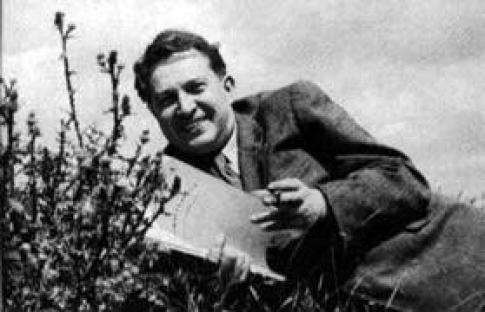Jaroslav Seifert (1901 – 1986)

Poet and journalist who was the first Czech to win the Nobel Prize for Literature in 1984.
An Umbrella from Piccadilly
By Jaroslav Seifert *
If you’re at your wits’ end concerning love
try falling in love again —
say, with the Queen of England.
Why not!
Her features are on every postage stamp
of that ancient kingdom.
But if you were to ask her
for a date in Hyde Park
you can bet that
you’d wait in vain.
If you’ve any sense at all
you’ll wisely tell yourself:
Why of course, I know:
it’s raining in Hyde Park today.
When he was in England
my son bought me in London’s Piccadilly
an elegant umbrella.
Whenever necessary
I now have above my head
my own small sky
which may be black
but in its tensioned wire spokes
God’s mercy may be flowing like
an electric current.
I open my umbrella even when it’s not raining,
as a canopy
over the volume of Shakespeare’s sonnets
I carry with me in my pocket.
But there are moments when I am frightened
even by the sparkling bouquet of the universe.
Outstripping its beauty
it threatens us with its infinity
and that is all too similar
to the sleep of death.
It also threatens us with the void and frostiness
of its thousands of stars
which at night delude us
with their gleam.
The one we have named Venus
is downright terrifying.
Its rocks are still on the boil
and like gigantic waves
mountains are rising up
and burning sulphur falls.
We always ask where hell is.
It is there!
But what use is a fragile umbrella
against the universe?
Besides, I don’t even carry it.
I have enough of a job
to walk along
clinging close to the ground
as a nocturnal moth in daytime
to the coarse bark of a tree.
All my life I have sought the paradise
that used to be here,
whose traces I have found
only on women’s lips
and in the curves of their skin
when it is warm with love.
All my life I have longed
for freedom.
At last I’ve discovered the door
that leads to it.
It is death.
Now that I’m old
some charming woman’s face
will sometimes waft between my lashes
and her smile will stir my blood.
Shyly I turn my head
and remember the Queen of England,
whose features are on every postage stamp
of that ancient kingdom.
God save the Queen!
Oh yes, I know quite well:
it’s raining in Hyde Park today.
* * *
Fragment of a Letter
All night rain lashed the windows.
I couldn’t go to sleep.
So I switched on the light
and wrote a letter.
If love could fly,
as of course it can’t,
and didn’t so often stay close to the ground,
it would be delightful to be enveloped
in its breeze.
But like infuriated bees
jealous kisses swarm down upon
the sweetness of the female body
and an impatient hand grasps
whatever it can reach,
and desire does not flag.
Even death might be without terror
at the moment of exultation.
But who has ever calculated
how much love goes
into one pair of open arms!
Letters to women
I always sent by pigeon post.
My conscience is clear.
I never entrusted them to sparrowhawks
or goshawks.
Under my pen the verses dance no longer
and like a tear in the corner of an eye
the word hangs back.
And all my life, at its end,
is now only a fast journey on a train:
I’m standing by the window of the carriage
and day after day
speeds back into yesterday
to join the black mists of sorrow.
At times I helplessly catch hold
of the emergency brake.
Perhaps I shall once more catch sight
of a woman’s smile,
trapped like a torn-off flower
on the lashes of her eyes.
Perhaps I may still be allowed
to send those eyes at least one kiss
before they’re lost to me in the dark.
Perhaps once more I shall even see
a slender ankle
chiselled like a gem
out of warm tenderness,
so that I might once more
half choke with longing.
How much is there that man must leave behind
as the train inexorably approaches
Lethe Station
with its plantations of shimmering asphodels
amidst whose perfume everything is forgotten.
Including human love.
That is the final stop:
the train goes no further.
“Fragment of a Letter” from The Poetry of Jaroslav Seifert
Translated from the Czech by Ewald Osers
Edited by George Gibian
* * *
* Jaroslav Seifert
The Nobel Prize in Literature 1984
Born: 23 September 1901, Prague, Austria-Hungary (now Czech Republic)
Died: 10 January 1986, Prague, Czechoslovakia
Residence at the time of the award: Czechoslovakia
Prize motivation: "for his poetry which endowed with freshness, sensuality and rich inventiveness provides a liberating image of the indomitable spirit and versatility of man."




 del.icio.us
del.icio.us Digg
Digg

Post your comment